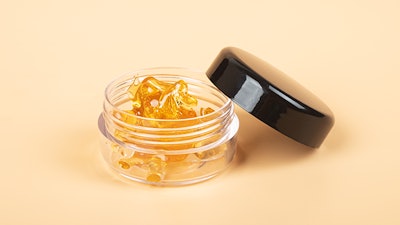
In early fall, addiction researchers at the University of Washington School of Medicine published and delivered a report that addresses the public health challenges of cannabis products highly concentrated with the psychoactive ingredient THC (tetrahydrocannabinol).
Commissioned by the state's Health Care Authority, the report is intended to help state legislators identify community-supported policy options to disincentivize the nonmedical use of cannabis products with more than 35% THC.
Policy options may include product warning labels, taxation per THC content, and a public education campaign, said Beatriz Carlini, the lead author and a researcher at the UW’s Addictions, Drug & Alcohol Institute (ADAI). Carlini said she would discuss report details and the authors' recommendations in January, after the Legislature convenes.
Ten years ago, she said, when Washington state broke trail and became first in the U.S. to legalize the sale and use of recreational cannabis, it was difficult to imagine what commercialization could mean for cannabis. Proponents of the law said people should be able to access cannabis to change their perception of reality and to treat medical conditions without stigma.
No one was arguing for manufacturers' rights to distill cannabis into a significantly more powerful product that only faintly resembles the plant.
“I don’t remember voting for 90% THC,” Carlini said. "But we learned the real issue was not legalization; it was commoditization. The market made cannabis a commodity like the iPhone or your jeans, and manufacturers want to make the product better, more efficient — which in the case of nonmedical cannabis means stronger. They are trying to make a profit, so they want loyal patrons who depend on this high-potency cannabis just like they depend on their cell phones.”
The problem increasingly is that novice users of high-potency cannabis concentrates, often called “dabs,” end up on poison-control hotlines or in hospital emergency rooms in the throes of paranoia or panic attacks. Because these products lack labeling about a serving size, users can be unaware that they have consumed a chemically synthesized, mind-bending “hit” equivalent to 190-proof alcohol.
“The botanical cannabis plant has a limit of THC percentage,” Carlini said. “We are talking about commercial processes that transform the plant into something else so the THC potency is greatly amplified.”
Existing research indicates that consuming cannabis with increased THC potency heightens a user’s chances of developing a psychotic disorder for life, particularly among young people. “And that research identified high-potency as any cannabis with more than 10% THC,” Carlini said.
“The cannabis plant's raw flower material can have between 10 and 20% of THC concentration. These dabs and vapes are way past that.”
She clarified that the ADAI report does not scrutinize the sale or use of cannabis products whose THC levels are below 35%. Those products account for about seven of every 10 purchases in Washington state, but the high-THC concentrates’ shelf space and sales have grown rapidly as manufacturers have increased marketing efforts.
The researchers approached the issue by gathering and assessing information, including:
- THC-product policies and initiatives implemented by other U.S. states and Canada.
- Perspectives of stakeholders among community members, healthcare professionals, state agencies, prevention agencies, cannabis consumers and the cannabis industry.
- Organizations that have increased awareness of harms associated with high-THC products.
- Scientific data about the mental health risks of high-THC potency products and, separately, policy research on how to regulate tobacco, alcohol and unhealthy foods.
The report is a starting point for Washington state lawmakers to consider options. Any bill put forward to amend the law could face industry opposition. In August, California’s state Senate passed the Cannabis Right to Know Act (SB1097), which would have provided consumer warnings about well-recognized health risks associated with high-THC products. But the bill was pulled from the Assembly floor after it came under fire from the California Cannabis Industry Association.
The UW authors’ overarching motivation is to reduce users’ vulnerability to an experience of psychiatric crisis.
“It is not only about people having anxiety and panic after being exposed to an enormous amount of THC in one hit. It is also about how using this amount of THC increases people’s chance to develop a full-blown psychotic disorders,” Carlini said.






















